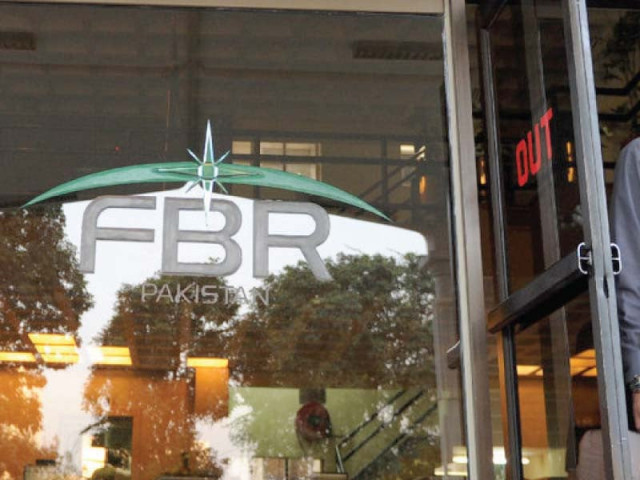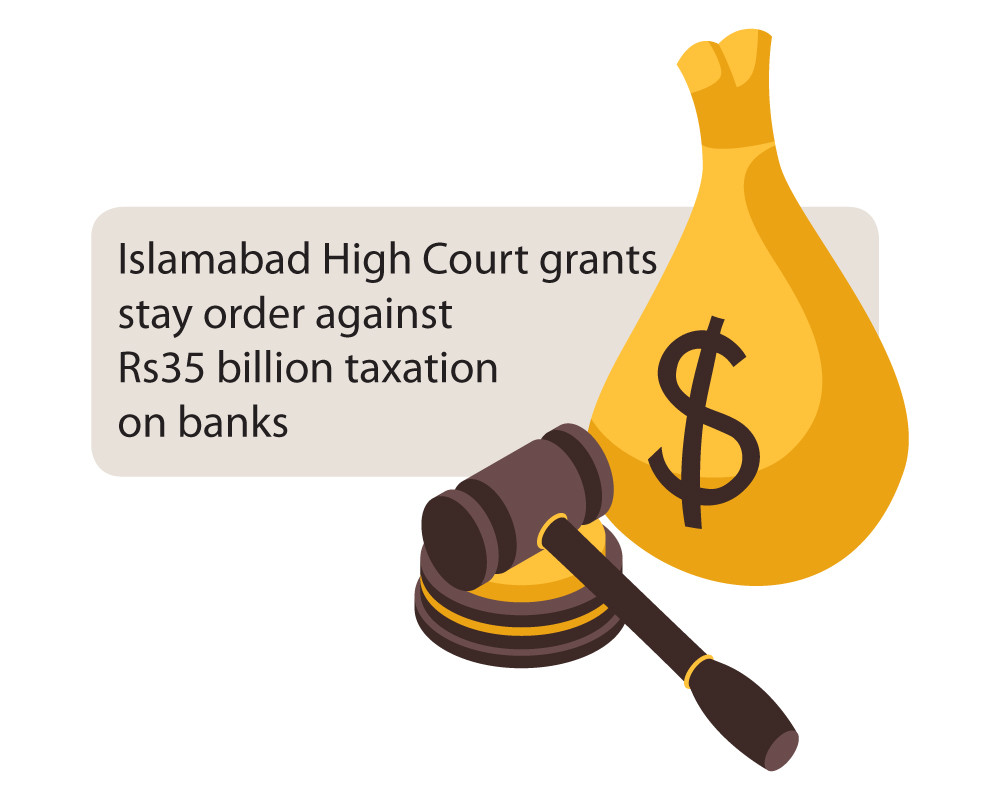IHC halts Rs35b tax on banks
Suspends windfall tax decision, questions legality, powers of interim setup

The Islamabad High Court (IHC) on Wednesday suspended the government’s decision to impose a windfall income tax on commercial banks for the recovery of Rs35 billion, after lawyers questioned the powers of the interim setup and the constitutionality of the move.
The court’s decision came a day before the last date for the payment of an estimated Rs35 billion tax by those commercial banks that had manipulated the value of foreign currency to make extra profits.
Read: 40% tax on banks’ windfall profits
The Federal Board of Revenue (FBR) was betting on the Rs35 billion in revenues to achieve its monthly target of nearly Rs711 billion. It is now left with the goal of collecting over Rs100 billion more today (Thursday) to meet the monthly target, although it may achieve the five-month tax collection target of Rs3.45 trillion.

design: Ibrahim Yahya
design: Ibrahim Yahya
“The submissions (by petitioners) demonstrate not only a prima facie case but also that the ingredients of balance of convenience and irreparable loss operate in favour of the petitioner. Resultantly, the operation of the impugned statutory regulatory order shall remain suspended till the next date of hearing,” reads the short order of the court.
Eight days ago, the FBR, through SRO 1588, had imposed a 40% windfall income tax on income from foreign exchange of banking companies for the preceding two years ended on December 31, 2021, and 2022.
Advocate Supreme Court, Salman Akram Raja, pleaded before the court on behalf of his banking clients.
While the government had anticipated banks to challenge the levy, the financial institutions were finding it difficult to hire lawyers to plead their case.
The government had issued the SRO under section 99D, which the Parliament had inserted into the law in June this year. While the FBR imposed taxes on the banks to get an additional Rs35 billion out of an estimated Rs90 billion windfall income, it conveniently ignored a windfall profit of approximately Rs1.5 trillion made by exporters. The Ministry of Finance has estimated that the exporters made a windfall gain of Rs1.5 trillion due to steep currency devaluation these past few years.
The banks’ lawyers argued that section 99D (through which the federal government could determine a tax rate between 0% and 40%) was tantamount to excessive delegation of power by Parliament and in breach of Article 77 of the Constitution.
The legal team also questioned the power of the caretaker government in imposing the tax, arguing that the function of the caretaker government was only to “attend to day-to-day affairs and (it) cannot extend its authority to a fresh taxation measure.”
The legal team also argued that the SRO was also defective in that the determination of the preconditions under section 99D, namely, the economic factors that led to the windfall income as well as the quantum of the windfall income, are conspicuous by their absence in the impugned SRO.
The team further argued that by reading the SRO, there was only an underlying (but invalidated) assumption that external economic factors have actually operated and led to a windfall income but without these being spelt out in the notification, which would be expected given the letter and spirit of section 99D.
The petitioners also claimed that the charge of additional tax conflicted with entry number 47 in the Legislative List for imposing an additional tax which was not warranted.
The law requires that the notification of the windfall tax has to be placed before the National Assembly within three months –a clause that the banks have now invoked as there is no assembly in Pakistan and the next elections are scheduled for February 8th.
The lawyer argued before the court that the government assumes that the next assembly will validate its action but it is quite possible that the National Assembly does not agree to bless the notification.
If the next assembly rejects the additional tax, banks would be at a disadvantageous position, according to the petitioners.
The court did not accept the arguments of the FBR legal counsel who submitted that the legislation has to remain operative until it is declared ultra vires. The court accepted the banks’ argument that the interim relief is sought in respect of the SRO, which is an executive act and not legislation and, therefore, prima facie not covered by the judgments on the point referred to by the counsel for the FBR.
Published in The Express Tribune, November 30th, 2023.
Like Business on Facebook, follow @TribuneBiz on Twitter to stay informed and join in the conversation.



















COMMENTS
Comments are moderated and generally will be posted if they are on-topic and not abusive.
For more information, please see our Comments FAQ